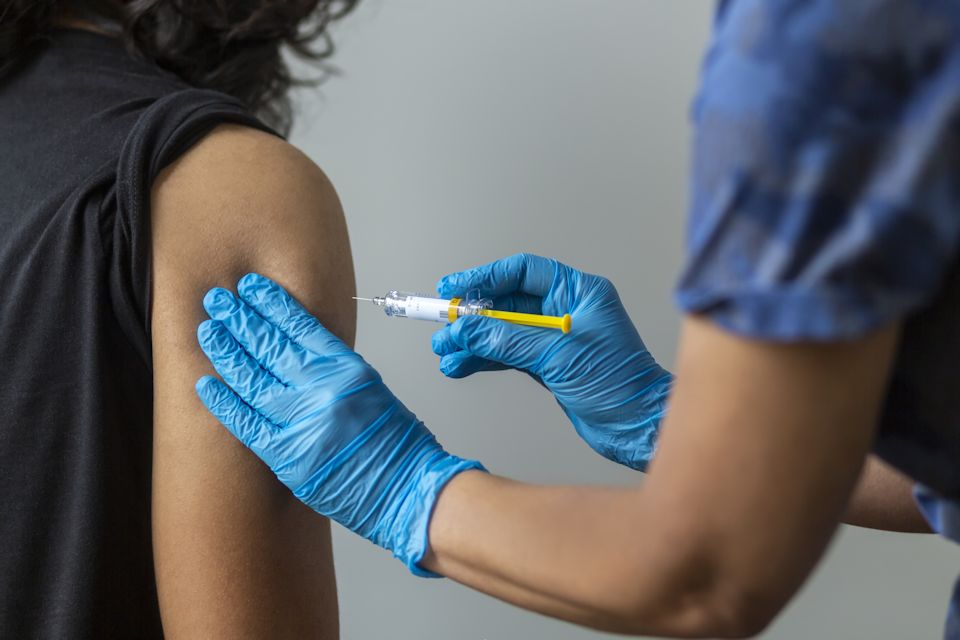Reflecting on vaccine hesitancy in African American communities, the Rev. Kennetha Bigham-Tsai calls for trust and encourages others to join her in rolling up their sleeves to be free of COVID-19.
KENNETHA J. BIGHAM-TSAI
Connectional Table, United Methodist Church
We are in a new year. Many are happy that 2020, with its loses and struggles, is gone. After all, 2020 was the year we lost John Lewis, Kobe Bryant, and Chadwick Boseman. It was the year that racism reared its head in the deadliest ways, with the killings of Ahmaud Arbery, Breonna Taylor, and George Floyd.
It also was the year that the novel coronavirus took the lives of more than 342,000 Americans, many of them people of color. Indeed, coronavirus-related deaths for African Americans outpace those for whites by nearly three to one.[1] According to a Beaumont Foundation study, 34% of African Americans have known someone who has died from COVID-19.[2]
Recently-developed vaccines could be lifesavers, especially as a new and more contagious variant of the virus has been identified in the United States. However, according to one study, 35 percent of African American adults say they will not take the vaccines.[3]
This level of vaccine hesitancy in African Americans is understandable. It is bred by distrust for which there is good cause. Black people have long been the victims of racism in health care. We have been on the receiving end of medical experimentation without informed consent. We all know of the famed “Tuskegee Syphilis Study,” in which Black men were allowed to die of syphilis, uninformed of the researchers’ decision to withhold treatment. In her book, Medical Apartheid, Dr. Harriet Washington noted that the Tuskegee experiment impacted the entire Black community, as these men inadvertently infected their wives, some of whom bore children with syphilis-related birth defects. Tragically, the doctors involved in the study justified withholding treatment by claiming that their Black subjects would resist it.[4] That was not true then, nor should it be now.
The Black community must have access to life-saving vaccines. We also must demand that they be distributed in our communities in ways that build trust. That means ensuring education and informed consent. It means not singling out any given community, but making the vaccines available to all.
This is being done in the vaccine distribution that has happened so far. To date, the vaccine has primarily been offered to health care workers. It is being rolled out to nursing homes. And it will be distributed to white, Black, and Brown communities alike. As well, many national and state-level health organizations are offering education about the vaccines to help people understand that they are safe and effective.
In addition to these measures, building trust in the Black community will require involving trusted Black institutions. In this way, the church could help. I have been a United Methodist pastor for 14 years in The Michigan Conference. I have pastored local churches and served as a district superintendent for more than 70 churches in Lansing, MI, and beyond. I currently serve the denomination at the national and international levels. I know of Black churches in Michigan and throughout the United States that could host vaccine drives. Black pastors could roll up their own sleeves to show that taking the vaccine is safe.
When I have the opportunity, I will certainly roll up my sleeve, knowing full well the history of Tuskegee and other abuses that have made Black people distrustful. I will take the vaccine because I also know what is happening in Black communities today. We are getting sick and dying from Covid-19. Joblessness and financial ruin are pushing our communities further into poverty. Our children are falling through the cracks in their education.
To help bring a solution to all of that, I will continue to wear a mask. Until the vaccines are widely distributed, I will avoid crowds and limit the number of people with whom I share indoor air. I will wash my hands frequently while humming Steve Wonder’s “Happy Birthday.” They say that singing the chorus all the way through twice is how long you should scrub.
Stevie Wonder wrote that song in honor of the Rev. Dr. Martin Luther King, Jr. If Martin were alive today, I think that he would roll up his sleeve too because he cared that all Black people be free. We are still working on that project. But we can’t get there until we are free of Covid-19.
~ Rev. Kennetha Bigham-Tsai serves as the Chief Connectional Ministries Officer of the Connectional Table of The United Methodist Church. The Connectional Table is the body that discerns and articulates the vision for the denomination in consultation with the United Methodist Council of Bishops. Rev. Bigham-Tsai also has pastored local congregations and served as a district superintendent for more than 70 churches in central Michigan. Rev. Bigham-Tsai resides in Lansing, MI, with her husband Kee Tsai and their two children, Keeton and Kamden Bigham-Tsai.
[1] “Covid-19 Hospitalization and Death by Ethnicity,” Centers for Disease Control and Prevention, November 30, 2020
[2] “Over One-Third of African Americans Have Lost Someone Close to COVID: Poll,” by Jeffery Martin, Newsweek, 11/30/20
[3] KFF Covid-19 Vaccine Monitor: December 2020,” by Liz Hamel, Ashley Kirzinger, Cailey Munana, and Mollyann Brodie, December 15, 2020
[4] Cf. Medical Apartheid: The Dark History of Medical Experimentation on Black Americans from Colonial Times to the Present, by Harriet A. Washington, Anchor Books, New York: 2006, pp. 157ff.
Last Updated on January 19, 2021

